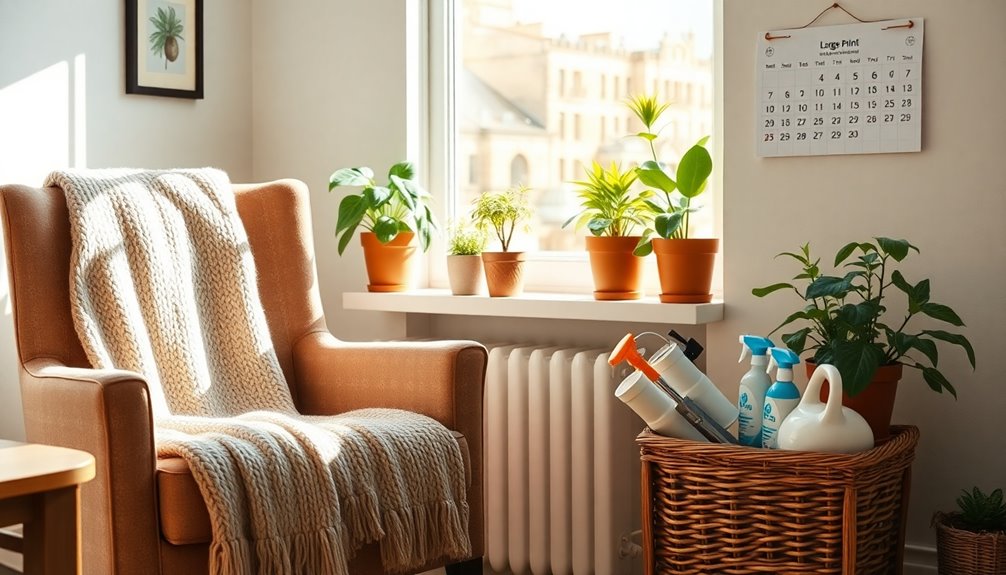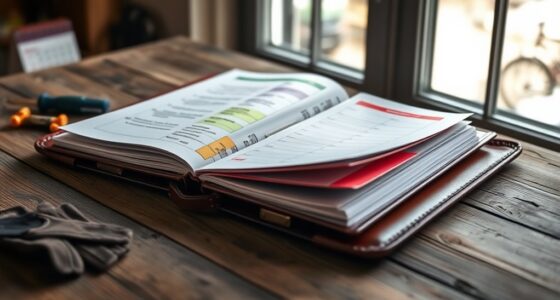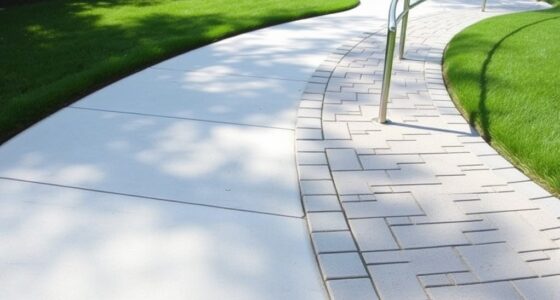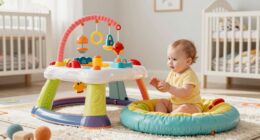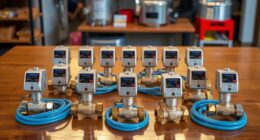To simplify elderly home upkeep, start with routine maintenance checks for HVAC, plumbing, and roofing systems. Create seasonal checklists to address specific tasks, ensuring safety by eliminating trip hazards and installing grab bars in key areas. Engage family and community resources for support, and consider financial assistance programs to ease repair costs. Equip yourself with essential cleaning tools and prioritize decluttering for a healthier home environment. Discover more expert tips for effective elderly home management!
Key Takeaways
- Schedule regular inspections for HVAC, plumbing, and roofing to identify issues early and avoid costly repairs.
- Simplify safety by removing tripping hazards and installing grab bars and non-slip rugs in key areas.
- Engage family members in routine maintenance tasks for support and accountability in home upkeep.
- Utilize community resources for affordable repair assistance and volunteer programs for minor home improvements.
- Consider home warranty plans to financially manage unexpected repair costs and ease maintenance burdens.
Importance of Routine Home Maintenance
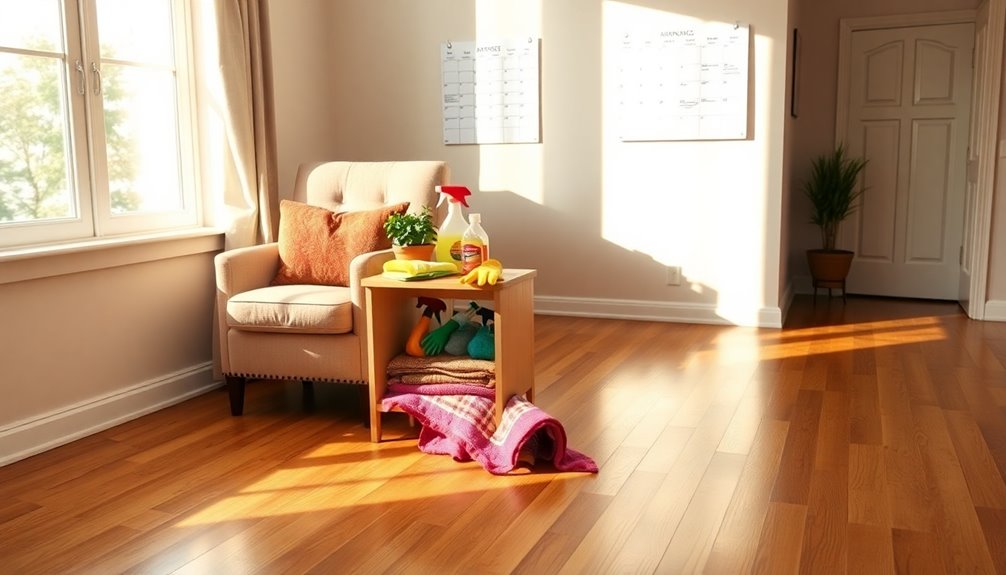
While you may not think about it often, routine home maintenance is essential for keeping your home in top shape and preserving its value.
By engaging in regular inspections of major systems like HVAC, plumbing, and roofing, you can spot issues early and prevent costly repairs down the line. This proactive approach not only saves you money but also addresses safety concerns, ensuring that your living environment remains comfortable and secure. Furthermore, homes without security systems are 300% more likely to be burglarized, highlighting the importance of integrating safety measures. For elderly residents, maintaining these systems is particularly important, as it contributes to a healthier home. Additionally, incorporating best home security systems can significantly enhance safety and peace of mind for elderly individuals living alone. Regular maintenance can also help to reduce the risk of financial scams that often take advantage of vulnerable seniors.
Seasonal Maintenance Checklists
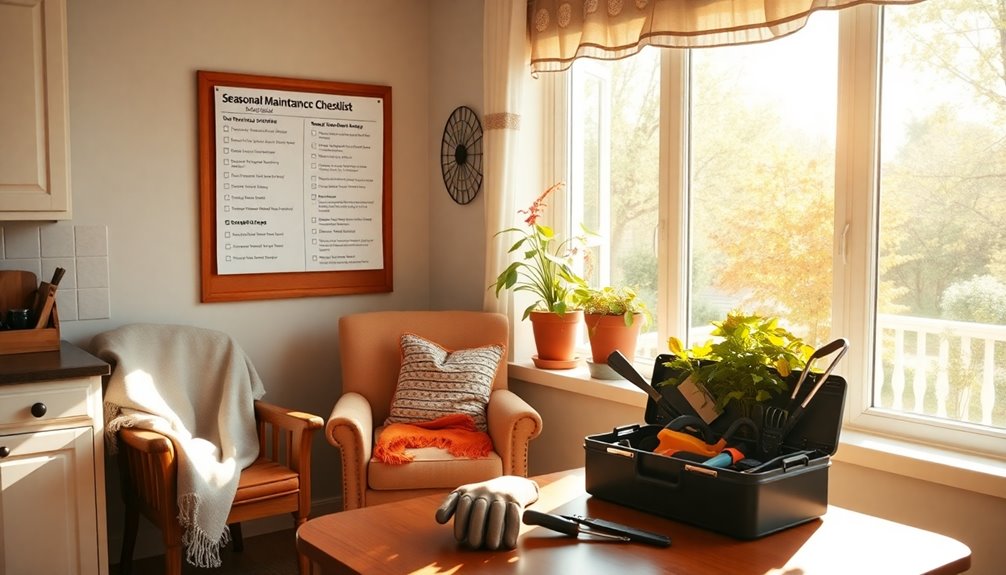
To keep your home safe and functional throughout the year, it's crucial to follow seasonal maintenance checklists.
In spring, conduct a thorough cleaning, inspect for winter damage, and check your roof for missing or damaged shingles.
Summer's focus should be on servicing your air conditioning units and trimming overgrown vegetation to prevent pests.
As fall arrives, weather strip windows and doors while checking attic insulation for winter readiness.
In winter, insulate exposed pipes and prepare heaters and generators for potential outages.
By adhering to these seasonal checklists, you can efficiently address your home's maintenance needs.
Don't hesitate to seek professional services for complex tasks, ensuring your home remains comfortable and secure year-round.
Ensuring Home Safety
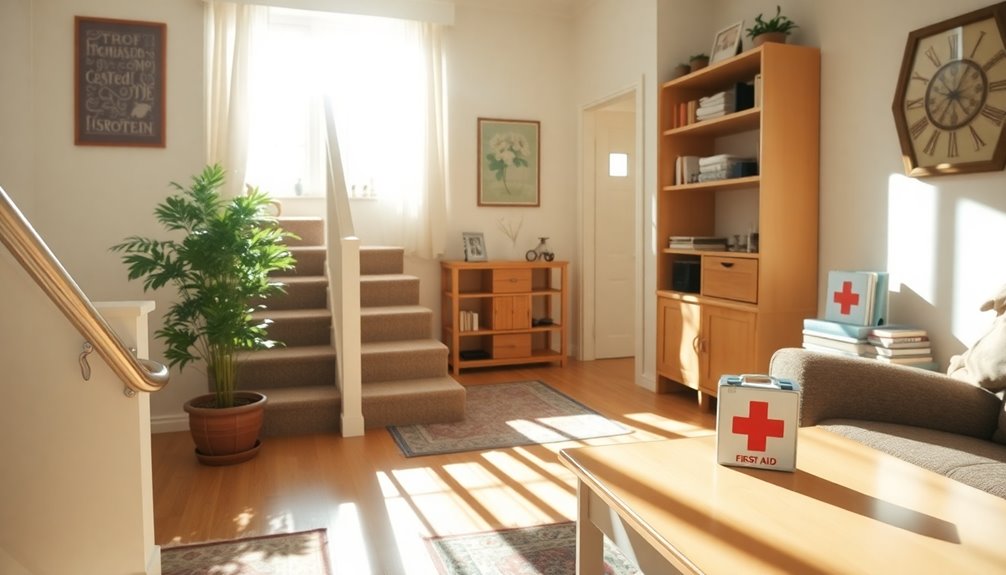
To guarantee your home is safe, start by eliminating tripping hazards like wrinkled rugs and cluttered walkways. Installing non-slip rugs and placing night lights in key areas can also improve stability and navigation. Additionally, ensuring your heat pump is well-maintained can help maintain a comfortable temperature, reducing the likelihood of accidents due to extreme weather conditions or heat pump failure. Regularly checking soil moisture levels in any indoor plants can also contribute to a safer environment by preventing overwatering and reducing the risk of slips from excess water. These simple steps can considerably reduce the risk of falls and create a safer living environment for you. Additionally, consider implementing innovative solutions like grab bars in bathrooms and handrails on stairways to further enhance safety.
Tripping Hazard Prevention
Home safety is crucial for seniors, and one of the most effective ways to prevent falls is by addressing tripping hazards. Start by removing wrinkled rugs and clearing walkways, as loose items contribute considerably to falls. Install non-slip rugs and night lights in hallways to enhance visibility at night. Regularly check windows and doors to verify they function properly for safe evacuations. Additionally, utilize grab bars in bathrooms and handrails on stairways for extra support. Conduct routine inspections for hazards like loose cords or uneven flooring. It's important to remember that federal funding can help provide resources for home safety modifications. Moreover, creating a safe living environment can be as essential as ensuring year-round access to recreational facilities for physical activity. Here's a quick checklist to keep in mind:
| Action | Frequency |
|---|---|
| Remove loose rugs | Weekly |
| Check grab bars | Monthly |
| Inspect lighting | Monthly |
| Clear walkways | Daily |
| Test window/door locks | Quarterly |
To further enhance safety, consider incorporating emotional support resources that address the unique challenges seniors may face during transitions or changes in their living situations.
Essential Safety Installations
Addressing tripping hazards is just one aspect of creating a safe living environment for seniors; there are several installations that can enhance home safety further.
Seniors need smoke and carbon monoxide detectors on every floor, tested monthly with fresh batteries. Non-slip rugs and night lights in bedrooms and hallways improve visibility, reducing fall risks at night. Additionally, incorporating advance directives into discussions about home safety can ensure that medical preferences are understood in case of emergencies. Regular maintenance of appliances can also contribute to safety by preventing potential hazards, such as faulty thermostats.
Regularly check windows and doors to verify they function correctly and lock securely, keeping unwanted intruders out. To further promote safety, eliminate tripping hazards by removing wrinkled rugs and clearing pathways.
Consider using a humidifier in the bedroom for better breathing and comfort. These essential safety installations can be a part of a thorough safe at home program, guaranteeing peace of mind for both seniors and caregivers. Additionally, exploring unique culinary experiences can provide opportunities for seniors to enjoy engaging activities while maintaining a safe environment.
Engaging Family and Community Resources
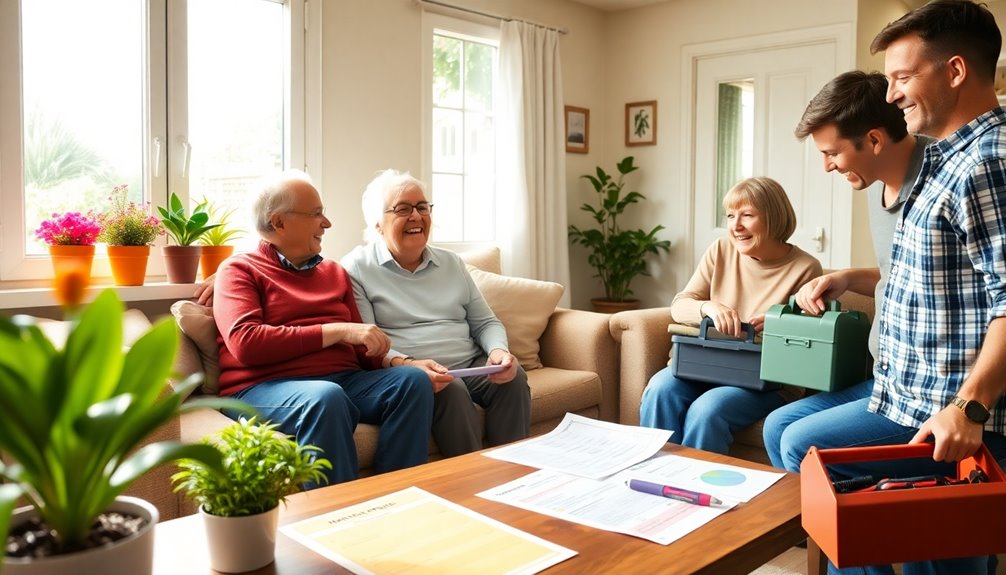
Engaging your family can make a big difference in maintaining your home, as they can help you stay accountable and offer support for upkeep tasks. Additionally, involving them in routine activities can foster emotional well-being for both you and your loved ones. Don't forget about local community resources, like volunteer programs or college students looking to lend a hand—they can provide affordable assistance for repairs and modifications. Additionally, seeking out mental health resources can help alleviate stress associated with home maintenance responsibilities. To further support your efforts, consider utilizing strategies for effective discipline to help create a harmonious home environment, encouraging cooperation and responsibility among family members.
Family Support Systems
While it might seem overwhelming to tackle home maintenance for elderly relatives, involving family members can create a supportive network that simplifies the process. By collaborating, you can address specific needs and share responsibilities, making upkeep less overwhelming. Additionally, establishing a support system can provide emotional and practical assistance during challenging times.
| Involvement | Benefits | Resources |
|---|---|---|
| Engage family members | Foster a collaborative approach | Community resources |
| Utilize local students | Provide volunteer assistance | Professional service options |
| Set up tech support | Reduce isolation and manage tasks | Vetted handyman services |
| Organize donation events | Declutter and build connections | Local community programs |
Tapping into community resources, like the Village to Village Network, can also help you find vetted local services to ease maintenance efforts.
Volunteer Assistance Programs
Involving family members in home maintenance can lead to discovering additional support through volunteer assistance programs.
Organizations like Rebuilding Together provide no-cost modifications and repairs aimed at enhancing safety and accessibility for seniors living at home.
The Village to Village Network connects you with vetted volunteers who help seniors with minor repairs, meal preparation, and technical support, fostering community engagement.
Local colleges often have students enthusiastic to volunteer their time for home maintenance and organization tasks, benefiting both parties.
Many community action agencies also offer volunteer programs tailored for low-income and elderly households, providing free home repairs and modifications.
Local Community Resources
How can you tap into local community resources to enhance home maintenance for seniors?
Start by reaching out to Local Agencies on Aging, which can connect you with home maintenance services tailored to seniors' needs.
Community Action Agencies may also offer volunteer programs providing free repairs and modifications, creating a safer living environment.
Non-profit organizations like Rebuilding Together and Habitat for Humanity often have specific programs aimed at seniors, delivering no-cost home repairs and accessibility upgrades.
Don't forget to engage your family in these discussions—they can help identify safety concerns and necessary repairs.
Finally, utilize online platforms like Facebook and Angi to discover reliable local service providers and gather recommendations for trustworthy handymen.
Professional Home Repair Services
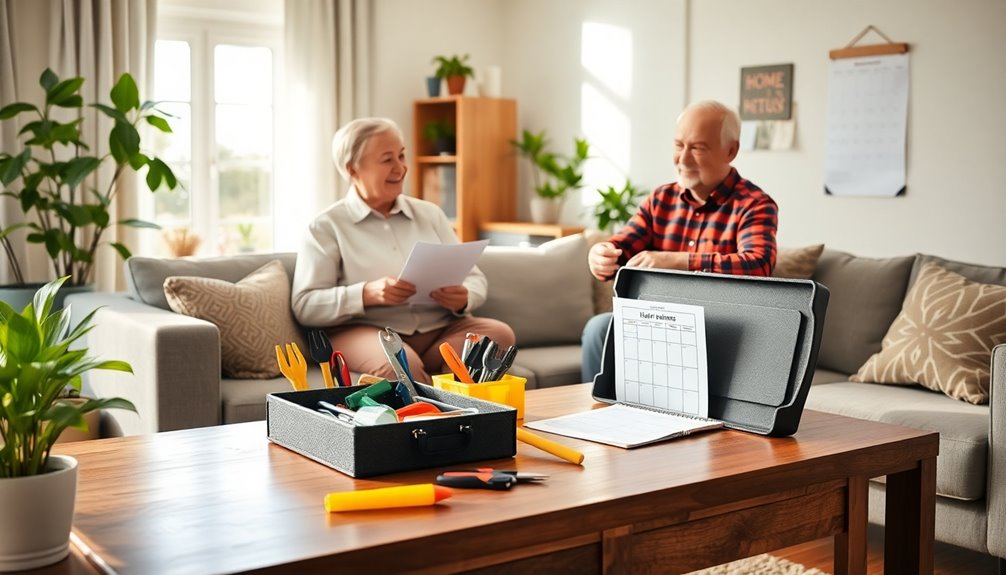
When you're looking to maintain a safe and functional home, professional home repair services can make all the difference.
These services, like those offered by Kaminskiy Care & Repair, are tailored to meet seniors' unique needs.
Here are three ways they can help:
- Accessibility Modifications: Installing grab bars and ramps to enhance mobility.
- Routine Maintenance: Addressing plumbing or electrical issues before they become emergencies.
- Safety Enhancements: Ensuring smoke detectors and security systems function properly.
When hiring, always verify contractors' credentials for reliability.
Many local agencies and organizations, such as Habitat for Humanity, offer no-cost repairs, relieving financial burdens.
Established companies provide written agreements too, ensuring you know exactly what to expect during your home maintenance projects.
Regular Cleaning Habits for Seniors
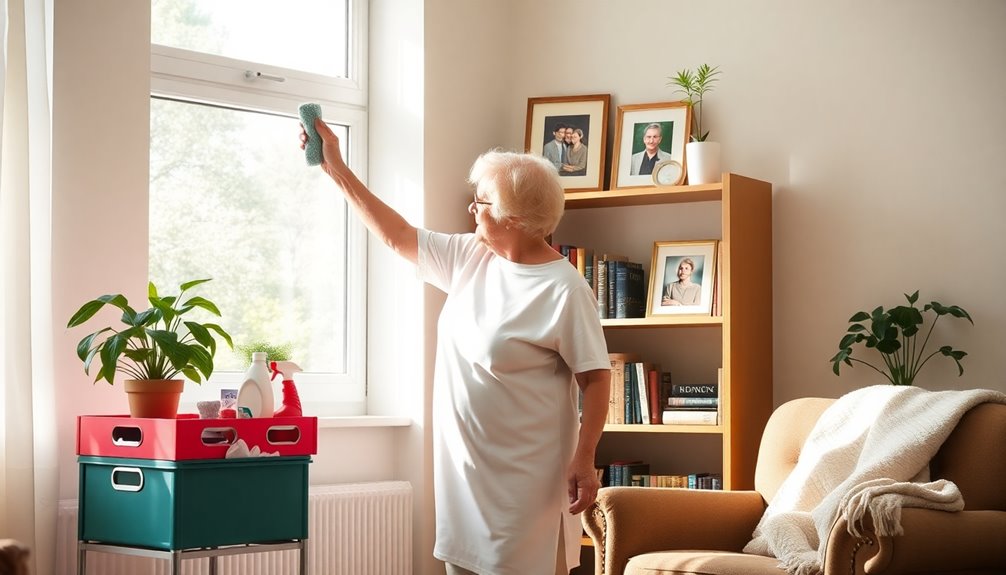
Maintaining a clean home is just as important as making necessary repairs, especially for seniors who want to guarantee their living space remains safe and welcoming.
Establishing regular cleaning habits can help you manage daily tasks without feeling overwhelmed. Consider setting aside 15 minutes each day for quick tidying sessions to prevent clutter from accumulating.
Utilize lightweight cleaning tools like vacuums and mops to reduce physical strain and make your routine easier. Don't hesitate to involve family members or hire professional cleaning services to lighten the load.
Additionally, engage in decluttering activities, such as removing expired items and organizing spaces, to enhance safety by reducing tripping hazards.
These practices will help you enjoy a more organized, clean home.
Essential Tools for Simplified Cleaning
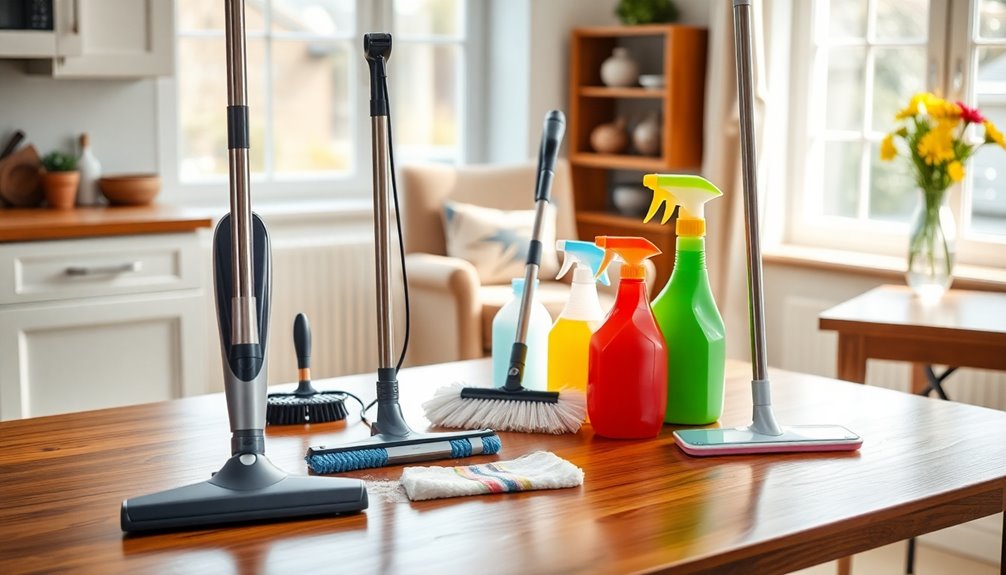
When it comes to cleaning, having the right tools can make all the difference for you.
Lightweight vacuums and robotic cleaners help you maintain a tidy home with minimal effort.
Plus, safety-enhancing tools like extendable dusters and grabber tools keep you safe while tackling those hard-to-reach areas.
Lightweight Cleaning Equipment
Cleaning your home doesn't have to be an intimidating task, especially with the right lightweight tools at your disposal.
These tools help reduce physical strain while keeping your living space tidy. Here are three essential items to contemplate:
- Lightweight vacuum cleaners – Perfect for seniors, they offer efficient cleaning without the bulk of robust vacuums.
- Extendable dusters – Safely reach high areas without ladders, minimizing fall risks during cleaning.
- Grabber tools – These handy devices allow you to pick up items without bending or reaching, promoting safer cleaning routines.
Automated Cleaning Solutions
Automated cleaning solutions can transform your home maintenance routine, making it easier and more efficient.
Robotic vacuum cleaners work independently, keeping your floors tidy with minimal supervision and reducing physical effort. For those facing unique challenges, lightweight vacuum cleaners and electric mops are designed for easy maneuverability, allowing you to clean without straining your body.
Extendable dusters help you safely reach high surfaces, eliminating the need for ladders or stools that can be hazardous. Plus, you can program smart home devices to operate on schedules, ensuring consistent cleaning without manual input.
These innovations not only simplify your cleaning tasks but also promote a safer, more manageable living environment for seniors.
Embrace these tools to enhance your home upkeep!
Safety-Enhancing Tools
To make home maintenance safer and more manageable, incorporating safety-enhancing tools is essential.
These tools simplify cleaning tasks, making them ideal for seniors who may face mobility challenges.
Here are three must-have tools:
- Lightweight vacuum cleaners – Designed for easy maneuverability, they help you maintain cleanliness without straining yourself.
- Extendable dusters – Reach high areas safely without climbing, reducing the risk of falls and injuries.
- Grabber tools – Perfect for picking up items without bending or overreaching, keeping your space tidy while preventing strain.
Prioritizing Safety During Upkeep
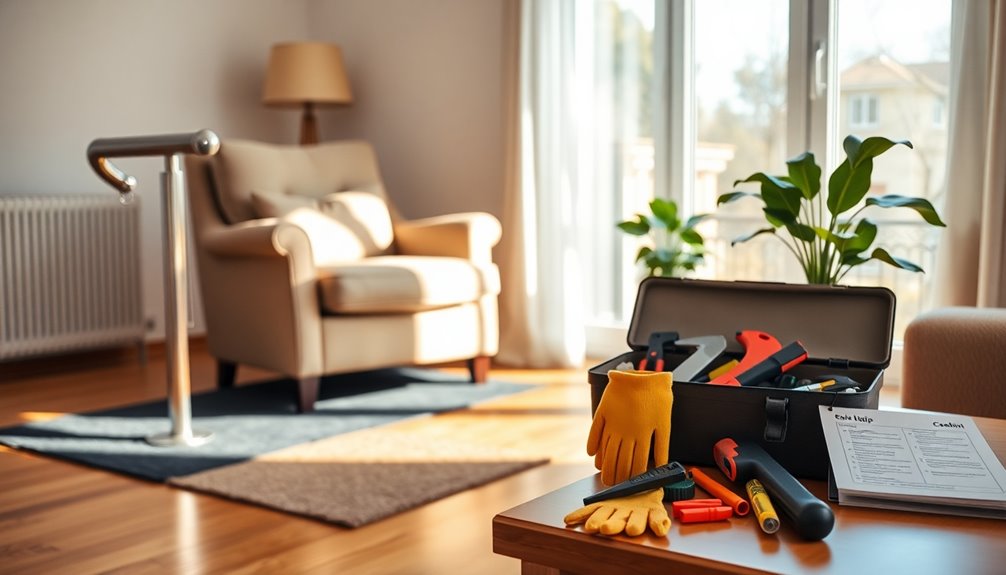
While maintaining a home, prioritizing safety is crucial for the well-being of seniors. Start by installing non-slip rugs and night lights in key areas to prevent falls.
Regularly check smoke and carbon monoxide detectors to guarantee proper functioning, as this can prevent life-threatening emergencies.
Use a humidifier in the bedroom to aid breathing and create a safer sleeping environment.
Clear walkways of tripping hazards like loose cords and clutter; this simple step is essential for preventing accidents.
Finally, conduct routine inspections of windows and doors to verify they function properly, enhancing security and safety for seniors living independently.
Decluttering Strategies for a Healthier Home
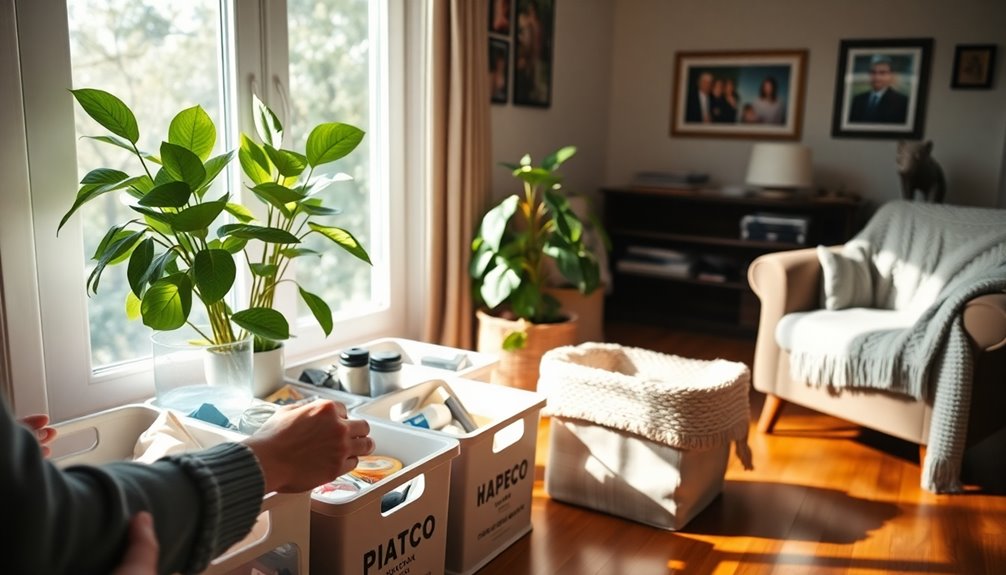
Creating a healthier home for yourself or a loved one starts with effective decluttering strategies.
Regularly removing items that pose tripping hazards is essential. Here are three tips to help you get started:
- Organize Cords: Use cord organizers to keep loose cables tidy and out of the way.
- Donate Unused Items: Encourage seniors to donate items they no longer use to local organizations, fostering community and reducing clutter.
- Establish a Cleaning Routine: Set designated days for specific cleaning tasks to maintain an organized, tidy living space.
Financial Resources and Assistance Programs
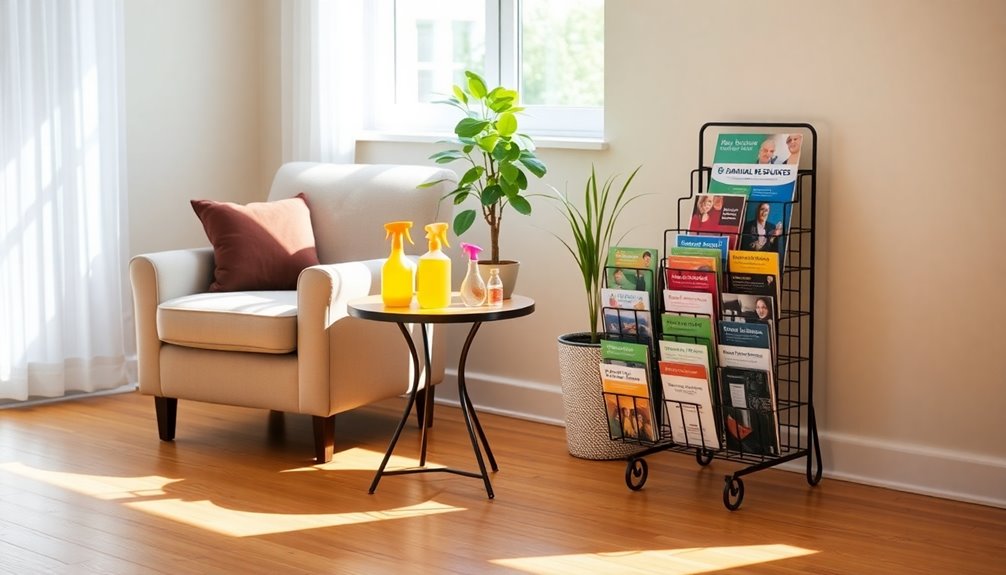
Finding financial resources and assistance programs can make a notable difference in maintaining a safe and comfortable home for seniors. Many local agencies offer financial assistance programs, like the Low Income Home Energy Assistance Program (LIHEAP), to help you manage energy costs.
Community Action Agencies can connect you with volunteers who provide essential home repairs, notably reducing your maintenance expenses. Additionally, grants from local housing departments can assist you in modifying your home for better safety and accessibility.
Organizations such as Habitat for Humanity and Rebuilding Together offer no-cost evaluations and modifications tailored for seniors. Finally, consider investing in home warranty plans to cover unexpected repair costs for essential systems and appliances, easing your financial burdens.
Frequently Asked Questions
How to Make Cleaning Easier for the Elderly?
To make cleaning easier for the elderly, start by using lightweight tools like vacuums and mops that reduce physical strain.
Create a cleaning schedule that breaks tasks into smaller sessions to avoid fatigue.
Don't hesitate to ask family members for help or consider hiring a cleaning service.
Additionally, invest in organizing tools to minimize clutter and enhance safety, and think about using robotic vacuums for effortless floor cleaning and a healthier home.
How Can I Help My Elderly Clean My House?
To help your elderly loved one clean the house, start by involving them in manageable tasks, which keeps their independence intact.
Use lightweight cleaning tools like electric mops or robotic vacuums to ease the physical burden.
Set a regular cleaning schedule to establish routine and prevent overwhelm.
Decluttering the space can also create a safer environment.
If deeper cleaning is needed, consider hiring a professional service that understands their unique needs.
How to Prepare a Home for the Elderly?
To prepare a home for the elderly, you'll want to enhance safety, improve comfort, and guarantee accessibility.
Start by installing non-slip rugs and placing night lights in critical areas. Regularly check windows and doors for proper function and security.
Eliminate tripping hazards by clearing walkways, and consider using a humidifier for better breathing.
Finally, confirm smoke and carbon monoxide detectors are installed and maintained to guarantee peace of mind in their living environment.
Conclusion
By prioritizing routine maintenance, you can transform a challenging task into a manageable part of your life. While the thought of home upkeep might feel overwhelming, remember that engaging family and community resources can lighten the load. Balancing safety with simplicity not only creates a healthier living space but also fosters independence. Embrace these expert tips to turn your home into a sanctuary that reflects your needs, blending comfort with security in every corner.
